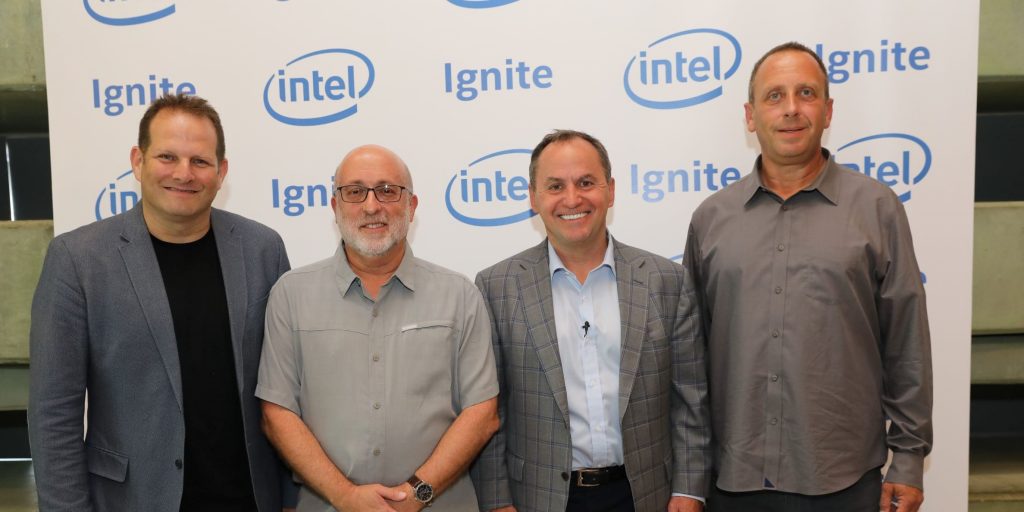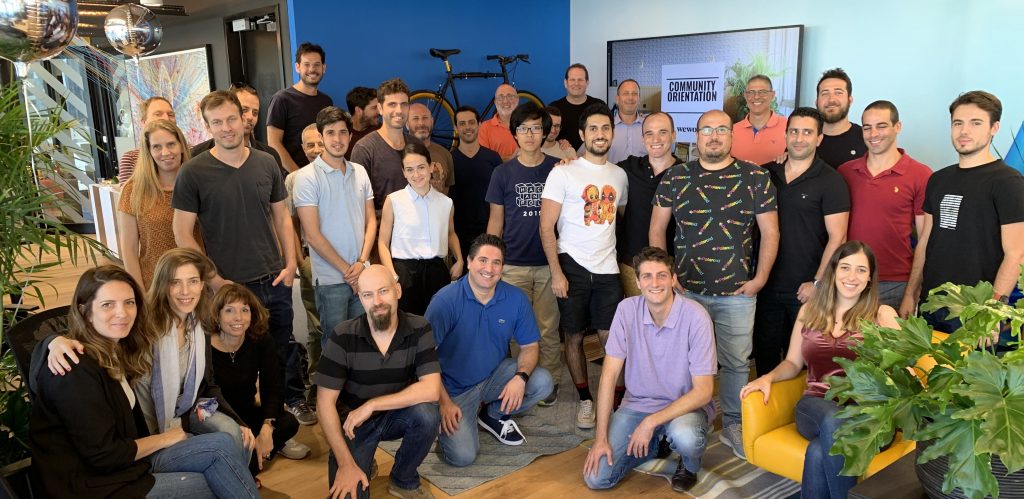Intel kicked off the launch of its new accelerator program in Israel on Tuesday for early-stage startups, announcing the nine data-centric companies that will be participating in the 16-week initiative.
The program, called “Ignite,” was first announced in June. Its aim is to “leverage Intel’s global market access, business, and technology leadership to provide early-stage startups [with a] unique advantage on their path to disrupt the future,” the tech giant said at the time.
“Intel has always worked in concert with open ecosystems to scale new technologies so they can be transformational for our customers, business and society,” said Intel CEO Bob Swan in June during a trip to Israel for the announcement.
SEE ALSO: Intel Launches Accelerator Program For Data-Centric Israeli Startups
“Israel has the deep skill base in AI, autonomous systems and the underlying technologies critical to these inflections that make it a natural choice to launch our Ignite program,” Swan said.

Intel said on Tuesday that the nine startups were selected out of 160 companies that applied to participate, followed by a round of 15 finalists. The winners were selected “based on their entrepreneurial spirit and groundbreaking ideas in technology,” Intel said in a statement.
They are:
- Cloudwize – a startup that enables organizations to maximize the value of their cloud architecture.
- Addionics – an Israeli startup with offices in the UK founded in 2017 that accelerates smart electrification by redesigning battery architecture.
- GleanLabs – a Tel Aviv-based startup founded in 2017 that offers an automatic employee competency mapping and management platform for large R&D organizations.
- Deci AI – a startup that provides acceleration of deep learning models, substantially reducing latency and cost-to-serve.
- Hi Auto – a startup that helps OEMs reinvent how customers spend their time in the car by offering a whitelabel voice platform that converses naturally with customers and works under any noise conditions.
- Granulate – a startup that developed software to reduce compute costs by up to 60 percent while maximizing performance.
- Mine – a startup that developed a platform to empower individuals and businesses to discover their digital footprint in order to reduce redundant risk.
- HourOne – a company with offices in NYC and Vancouver that developed a synthetic video creation platform powered by artificial intelligence.
- NOVOS – an Israeli startup founded in 2017 that developed a training platform for gamers who want to improve their skills.
As part of the program, Ignite will provide the startups with mentorship, knowledge, resources, and opportunities to connect with prominent investors in Israel and abroad.
The program has recruited leading mentors in various fields to deliver workshops and training focused on technology and entrepreneurship, including Gil Hirsch, founder of Face.com, Roni Zahavi CEO and co-founder of Hibob, and Ron Yekutiel, founder and chairman of Kaltura, Intel said. The participating companies will also receive financial advice from Deloitte, legal guidance from Pearl Cohen, and IT services from Intel.
“Ignite will supply these selected startups with the tools for success,” said Tzahi (Zack) Weisfeld, head of Ignite, in a statement.
Weisfeld, a former global head of Microsoft for Startups added: “Intel is responsible for much of the world’s technological infrastructure and aims to be twenty steps ahead of the game. The participants have the opportunity to take part in our vision, and can have an enormous impact on their fields through leading innovation globally.”
“For the startups to succeed is for Intel to succeed — it goes both ways,” Weisfeld said.
He tells NoCamels in a phone interview that Ignite is not just another accelerator. “It’s a high-intensity program that’s very thorough with a dedicated team and strong mentorship backing,” he explains.
Sign up for our free weekly newsletter
SubscribeWeisfeld says the startups will benefit from four types of mentors: industry mentors where they’ll be “matched” with committed, serial entrepreneurs in a managed process; Intel tech mentors where startups will be partnered with experts who will help drive the technical aspects; industry experts based on the needs of the individual startups; and workshop leaders who will help with the development of processes like product development and go-to-market strategies.
“These connections that they build can be invaluable and can last a lifetime,” Weisfeld says.
Intel will take no equity from the startups but the program will demand their time and energy. Weisfeld himself will meet weekly with each startup to assess progress and help guide them through any challenges, he says.
“This program’s KPIs [key performance indicators] are the business success of startups, their traction, and any follow-up funding,” Weisfeld explains.
Like the program, the selection process was also rigorous, he says. The startups were evaluated by two teams of between six to seven judges made up of industry experts and Intel executives. “We wanted to see a tech-based big idea that seeks to provide a solution to something, a good team, a good CEO, good energy, and coachability,” Weisfeld says, describing the whole process “more like a VC than an accelerator.”
“As Israel’s largest high tech company, we want to support the major technological changes emerging across our startup community,” Yaniv Garty, general manager of Intel Israel, said back in June.
“Ignite is an important step in this direction, focused on our efforts to transform the world through working on innovations in AI, autonomous, cyber and next-generation computing. With our advances in these areas, Intel is positioned to help companies charge forward. I’m confident that Intel’s unique expertise in hardware, software, and manufacturing will help the startups grow and succeed,” he added.
Intel employs about 11,000 people in Israel and another 1,000 from the Jerusalem-based autonomous systems company Mobileye which it acquired in 2017 for $15.3 billion. It is considered the largest employer in the high-tech sector.
SEE ALSO: Intel’s Israel Team Is At The Forefront Of 5G Tech That Will Revolutionize How We Communicate
Since it began operations in Israel in 1974, Intel indicated that its investment in the Israeli economy has totaled $35 billion so far.
The semiconductor giant has several sites across Israel, including a manufacturing site in Kiryat Gat, a development center in Haifa, a center in Petach Tikva for the development of components and software in the cellular communications market, and a design and development center in Yakum in central Israel which provides chipsets for mobile platforms.
Related posts

Editors’ & Readers’ Choice: 10 Favorite NoCamels Articles

Forward Facing: What Does The Future Hold For Israeli High-Tech?

Impact Innovation: Israeli Startups That Could Shape Our Future




Facebook comments